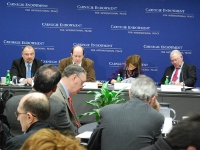Registration
You will receive an email confirming your registration.
Carnegie Moscow’s Maria Lipman and Nikolai Petrov and George Washington University’s Henry Hale joined Ambassador James Collins to discuss their paper, “Overmanaged Democracy in Russia: Governance Implications of Hybrid Regimes.” They examined the latest developments in Russian politics and Medvedev’s stewardship of the country, as the second anniversary of his presidency approaches.
A Hybrid Regime
The panelists described the current political system in Russia as a “sophisticated” hybrid regime, which combines elements of both democracy and authoritarianism. In Russia, this system pairs a very high degree of political control with a relatively low level of actual violence or coercion. The maintenance of elements of democracy provides the regime with benefits such as international legitimacy through elections, information and population feedback on regime policies.
Yet, as Henry Hale put it, Russian authorities “want to be democratic, but at the same time, they want to make sure that they always win.” To this end the regime creates substitutions for democratically accountable institutions, like the Presidential Council, in order to channel political and social discontent. They use manipulation of the media and micro-management to control the population, and what the panelists termed a ‘non-participation pact’ to guarantee the outcome of elections. This pact is the Kremlin’s way of supporting free elections: by denying certain individuals the right to run, they can hold elections free of fraud, but still ensure the selection of a candidate the regime deems acceptable.
Media in Russia
During the years of Putin’s presidency, control over the media was established and refined, Lipman stated. Federal news channels were and are kept under tight control by the Kremlin. While outside of those channels, free expression is possible, the absence of political competition or democratic checks and balances means that the degree of editorial independence is not sufficient to undermine the political monopoly of the ruling elite.
The economic crisis led to an expansion of freedom of expression. Anger at perceived governmental inefficiencies and growing social discontent required a response from the Kremlin. The regime allowed greater freedom to the press, but it is still pursuing the same policy, trying to expand freedoms without yielding any of its power. It has two chief methods for accomplishing this:
- Controlling national television channels: This enables the Kremlin to bury stories it doesn’t want receiving national attention. The prime examples of this are the recent protest rallies, which were thoroughly covered by a range of relatively independent media, but ignored by federal channels. The protest in Kaliningrad in January 2009, the biggest public rally since 2005, was completely ignored by the major national channels.
- Managing the freedom of the press: The government can reduce the scope and impact of any given story by exerting pressure on independent publications or their sources. This was seen on February 1, 2010 when the New Times published a story on police corruption featuring interviews with serving policemen who spoke openly about the rampant abuse of authority they had seen. The magazine editor was threatened with prosecution, and the policemen were forced to withdraw their testimonies.
Lipman concluded that, in the face of restricted television and print media, “the web may play a bigger role in the future, if more elections are rigged, or as accumulating problems and policy failures generate a discontent that the government will find increasingly hard to quash.”
The System under Medvedev
Russia’s hybrid system was in large part constructed under Putin’s presidency, and was tied to his leadership. Petrov noted three key points about the system after two years under Medvedev:
- The system is essentially the same: While changes were made to accommodate the new leader, much remains under Putin’s personal control. For example, in order to allow Putin to continue his authority over the Presidential Council, the Presidium of the Presidential Council was created. While President Medvedev heads the Presidential Council, which meets once a year, Prime Minister Putin heads the Presidium of the Presidential Council, which oversees various committees and meets on a more regular basis than the Council as a whole.
- Social unrest is becoming a bigger problem: There is no systemic or sustainable way to address problems of corruption and social unrest. Often, resolution is only achieved through Putin’s personal intervention, such as in Baikalsk or in Pikalyovo.
- The economic crisis has only been postponed: The “illusion that the crisis is almost over is pretty widespread in Russia,” said Petrov. In an attempt to prevent social unrest during the crisis, the Kremlin poured money into regional budgets. Now, all the regional budgets are cutting back on investments essential for growth.
The Need for Political Modernization
Since the start of 2010, Russia has already seen the creation of the State Council on political reform, a wave of social anti-government protests across the country, and open conflicts between United Russia party members and other political elites. Petrov suggested that these are signs of a growing realization among political elites that the system needs to be changed and that political modernization is necessary to ensure Russia’s political system is strong enough to face the new challenges ahead.
Any assessment of Medvedev’s first two years in office, Petrov argued, is primarily a discussion of Putin, and his past decade in power. In Russia’s hybrid political regime, Putin is the ultimate decision maker, who stands as a symbol of the balance between the most important elite clans in Russia. Those clans are the ones who need to unite over the idea of political modernization and to embrace it, in order for real progress to be made. Petrov speculated that if Putin returns to the presidency, and political modernization becomes beneficial to him personally, progress toward modernization would increase dramatically.
